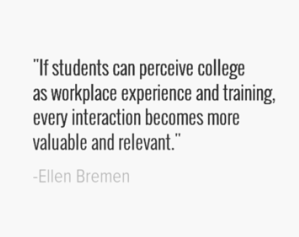
Communication: it’s how knowledge is shared and ideas are spread. Most importantly, it is something you are in total control of.
On a college campus, there are so many potential social interactions you can get yourself into that can be beneficial not only to your success in college, but your success in life.
This type of networking is going to take effort. This means taking initiative and doing things like striking up conversations, joining student clubs, going into office hours, and getting out of your comfort zone when it comes to making social connections.
College is supposed to prepare you for the real world, so there is no better time to start building professional communication skills. One of the best ways to building professional relationships and networking your way to success is through your professor. They’ve been there before; they’ve seen it all; they can guide you on the journey through college. Connecting on a deeper level with a professor can also lead to opportunities outside the classroom as they will become a great professional mentor who can provide excellent recommendations and connect you with potential scholarships, jobs, and internships.

In the following interview, communications expert Ellen Bremen, Professor of Communication and author of the book “Say This, NOT That to Your Professor: 36 Talking Tips for College Success,” will help us answer some questions regarding effective communication with your professor. It is chock-full of useful advice for students and covers topics such as:
- The benefits of taking time to connect with your professors
- How to approach a professor and establish a professional student-teacher relationship
- The proper way to keep in touch with a professor once a course is finished
- What you can do to make your college experience more valuable
- Advice on picking your professors
- How to manage difficult situations with a professor
- How to practice and build professional communication skills
Enter Ellen.
Why is it important that students connect with their professor?
Students have everything to gain by developing a working relationship with their prof. First, they can have a continual feedback loop about grades and ensure that they are getting the help they need in a timely manner.
Second, profs have access to everyone and everything else on campus. Want to know about a full class in a different department? Your prof can likely contact the other prof and ask how quickly the waitlist moves--historically speaking. Struggling with a transcript issue? Your prof can contact the Registrar and help you out. Not all profs are willing to do this, but many see themselves as a one-stop shop. They can cut through red tape quite a bit faster than students.
Finally, profs can offer tremendous career and professional advice and mentoring. Every prof was in school for a lengthy period of time, and although not all are directly connected to industry, they usually know people in various fields. Having a positive relationship with your prof (one that is authentic, rather than sucking up) can benefit you for years. That person may be willing to help you network, write you a recommendation letter, or give you future career advice.
What's the best way to reach out to a professor? How do students maintain and build on the student-teacher relationship both during and after they have had a class with a professor?
Most professors have regular office hours, so that would be the first place to start. It may feel uncomfortable to just walk into a professor's office, but this is what those hours are scheduled for--working with students. If you have a particular issue, you could schedule a meeting. Ask the prof after class what the best time would be for them, or give them a few times that work for your schedule and see if they are available. If you are looking to build an ongoing partnership, face-to-face is best, and you'll probably feel more comfortable with each meeting. However, you could e-mail and start dialogue that way, too.
Once class is finished, students can ask profs how they feel comfortable staying in touch. E-mail? LinkedIn? Facebook or other social media? Different professors have different feelings about interacting with students after class is over, so you'll want to find out how your prof handles this. I always recommend a personal note via e-mail before a blanket request on LinkedIn or other social media.
What are some things students can do to make their college experience more valuable? What can they do to become better students?
Making connections! Not only with profs, but with peers and other campus staff. I hate to sound old (which technically, I'm not!), but I am seeing more students buried in their phones than making small talk with others on campus. This is a true loss. You never know who you will meet or where the conversations can take you. Not to mention, students need to build those communication skills for job seeking. The only way to do that is to talk to others. There is everything to gain and nothing to lose by connecting with faculty, peers, and staff. Students will gain more help, increase their networking possibilities, and quite possibly, add a few new friends or study partners.
Having a great professor is vital to a positive college experience. What tips would you give in helping students choose their professors when it comes time for choosing classes?

This is a hard question to answer because I don't believe in hand-picking professors. You can't hand-pick your colleagues or your boss--instead, all of us need to learn how to navigate dynamics with different people and manage ourselves. Certainly, students can talk to other students, but remember, this is all going to be opinion, personal ability in that particular class, and that person's individual perception. This is why Rate My Professor is really an inaccurate reference point--you just never know the full story of why a person "rated" the prof in that particular way.
Sure, if you hear that one prof is really gruff or gives a boat-load of tests, that may be true. But, really, it doesn't matter. A term is a finite period of time, and students will gain a lot of growth and personal attributes by working with even the hardest professors. Also, even if you pick someone who is said to be the ideal professor, that person may suddenly be out on leave. Then what?

I would advise to try to meet the professor ahead of time. You could pop into office hours or ask for an early syllabus. This will give you a flavor of what you're in for. If the situation looks like it won't mesh with the rest of your load that term, you could make a different decision. But be careful about hand-picking too many supposedly ideal people and situations. Getting through the more challenging personalities and situations is what will give you the greatest experience for the workplace.
What do you like most about being a college professor? What do you find most rewarding?
Because of the subject I teach, Communication, I really love working with students on this immediately usable skill. I learn so much by hearing how students interpret the concepts we discuss, and I feel most rewarded when a student tells me that they managed a conflict or difficult interaction in a new way because of what they learned in my class. My equally rewarding moments are when students reach a new level of excellence in their public speaking. I have a ridiculous passion for public speaking, myself, and given that it frightens so many adults, watching my students find their voice and gain confidence just fills my soul.
If you could go back and do it all over again, what is one thing you would do differently about going to college?
When I was 21, my father unexpectedly dropped dead from leukemia, which he kept a secret from everyone. I was in community college at the time. My father and I were extremely close and his death shuttered me. Unfortunately, this was during finals. I tried feebly to go to the profs and figure out what to do, but I don't recall anyone offering me an incomplete or anything else due to the circumstances. I ended up failing out of college and fading out for another six years. I fell into a career that wasn't really right for me, but made good money. When I changed my mind about that career and needed degrees for my desired career (teaching college), those F's followed me. Obviously, here I am at age 46 and being tenured faculty in a job I love, so it all worked out great. However, I wish I would have had more self-advocacy and awareness of what I could have done to not have lost six years of my education. This is why I wrote Say This, NOT That to Your Professor: 36 Talking Tips for College Success. I want students to feel like there is transparency in policies and in dealings with professors, and I want them to feel more confident than I did when managing hard situations.
You warn against hand-picking too many supposedly ideal people and situations and how getting through challenging personalities and situations is key for growth… What are some things students can do to force themselves out of their comfort zones and really work on building professional communication skills?
To gain professional experience, the best tip is for students to genuinely connect with as many classmates, faculty, and staff as possible. Get involved with campus activities, form study groups, chat with profs and campus staff. Those conversations are the ones that will lead to critical communication practice for the workplace, as well as relevant stories and examples to use in interviews. If students can perceive college as workplace experience and training, every interaction becomes more valuable and relevant. Keep a running list of interactions, projects, and events that can later be used as professional talking points. Those talking points are what make students memorable as job candidates.
My best advice for students who want to learn more about communication is to make sure that they take their communication requirements (most colleges require at least one public speaking or communication course) very early in their academic career--not wait till the end as many do. I also recommend that students pick up an extra communication course, such as interpersonal communication, small group communication, etc. because the skills will be used everywhere and will be marketable for work.
###
About the Author:

